In Normal Accidents, Charles Perrow’s classic analysis of technological systems and the accidents they foster, Perrow observes that “when we have interactive systems that are tightly coupled, it is ‘normal’ for them to have this kind of accident, even though it is infrequent.” Such accidents are an “inherent property” of technological systems, and we have them because our industrial society is full of tightly coupled, interactive systems with great potential for catastrophe.
Here in Taiwan the omnipresence of tightly coupled systems — systems in which a failure in one leads to failure in another — operating in an atmosphere of intense production pressures and a lax safety culture has caused me to reflect often on Perrow’s insights. Everywhere you look, you see normal accidents.
ACCIDENTS ALL TOO COMMON
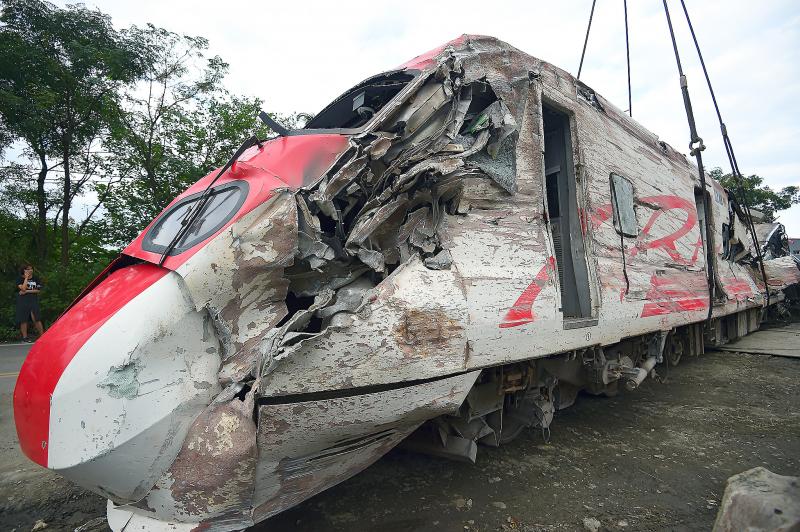
Photo: Chu Pei-hsiung, Taipei Times
Last week there was yet another catastrophic train accident, predictably attributed to some operator (in this case, of the truck), predictably seized upon by the Chinese Nationalist Party to criticize the ruling Democratic Progressive Party, predictably causing outrage that will predictably re-focus on the next inevitable normal accident. Only the pain of the dead and injured, rippling across the tightly-knit communities of the east coast, will linger.
Two systems, the road and the train, usually separated, interacted thanks to some minor neglect by the truck’s driver. With the tight coupling on the train line between trains leaving every 20-30 minutes a train was bound to come along. Additional safety features, such as a simple fence of concrete blocks along the road and/or rail line, had long been neglected.
The 2018 train accident near Sinma (新馬) Train Station in Yilan County, which killed 18 (including 8 in one family) and injured over 180, was the catalyst for some reforms, including the creation of a Taiwan Transportation Safety Board out of the old Aviation Safety Council. The administration of President Tsai Ing-wen (蔡英文) claimed it has implemented many of the recommendations of the report that came out of that accident.
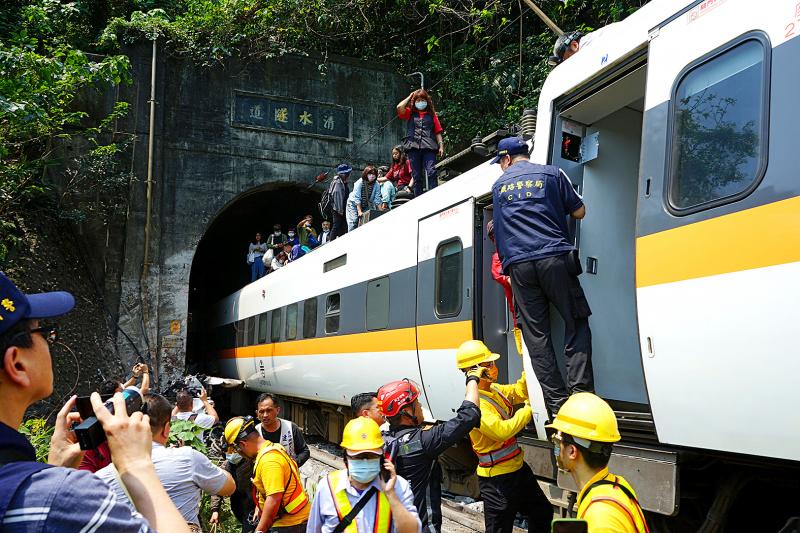
Photo: CNA
After this latest disaster, the Tsai administration of course presented the usual tiresome post-disaster Kabuki play, from Minister of Transportation and Communications Lin Chia-lung (林佳龍) offering his resignation to “take responsibility” — his dreams of the presidency dead, though in the political game, like its video counterpart, respawns are often possible — to apologies and promises of another round of reforms and reorganization, including a track warning system.
These will likely not matter: the pattern in accidents like this is always the same — some trivial part, usually a safety system, fails or is switched off or is ignored. In the 2018 accident the train driver was blamed for switching off the automatic train protection system, which would have warned the driver he was going too fast. Did he switch it off because he felt pressure to keep his speed up? In the famous 1991 crash in Miaoli, in which an express train collided with another train, the automatic train stop system was not working. Thirty people died. The driver, of course, was sentenced for involuntary homicide.
PASSING THE BUCK
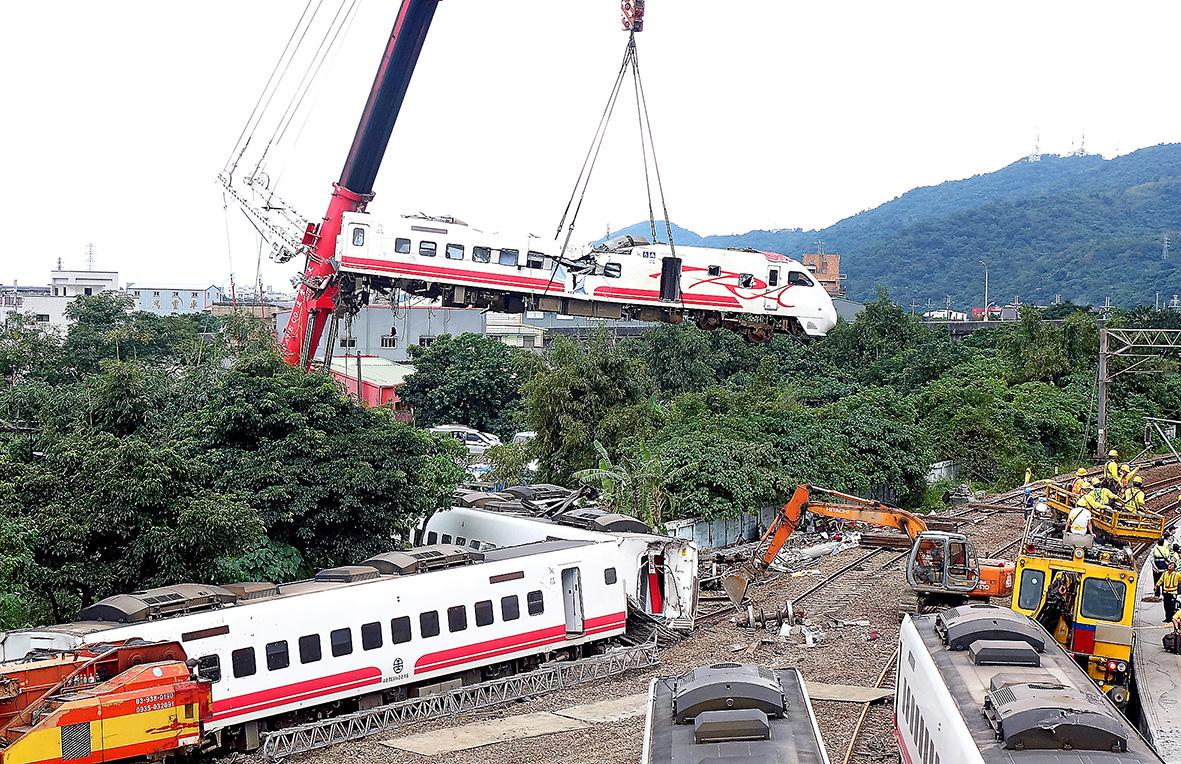
Photo: Chu Pei-hsiung, Taipei Times
Fortunately for the powers-that-be, there is always some convenient, low-ranking system operator to take the blame. If not for malfunctioning safety systems, then for production pressures.
Just last month, there was a major bus accident near Dongao (東澳) in Yilan County. The driver contended the brakes failed, but the authorities pointed to long skid marks on the road, indicating that they had worked. The driver took the blame. Passengers testified that the driver was speeding to catch up with the other two buses in his convoy. Under production pressure, of course.
The government announced it would reduce such bus convoys to two. A nice thought, but the drivers will continue to face production pressure and such accidents will continue to occur — normally.
In 2017, poor safety procedures under intense production pressures lead to the worst bus accident in decades when 33 died after a tour bus lost control on a highway exit ramp. The tour group was on a tight schedule, returning from the mountains, and the driver was likely to have been tired. Operator error, of course. Fatigue generated by production pressure is an occupational hazard of almost all workers in Taiwan.
A year before a bus fire in Taoyuan killed 26 Chinese tourists. The escape door had a lock and could never have been opened (safety system failure) — the crash had jammed it against a guardrail in any case. Everyone inside was trapped. The bus was authorized for a 24 volt transformer, but it had a 110 volt transformer. Because it was a low-cost tour and the bus company recouped its costs on commissions for shopping, safety procedures were allegedly skimped on (read: production pressure), a common problem since the industry was deregulated in 1995. Perhaps it was a short-circuit, though arson-suicide by the operator (who else?) is suspected.
Operator suicide on a pyre of mass death has become a form system failure in service businesses in recent decades as systems have become ever more tightly coupled in low wage, high pressure industrial systems. In the US, with its brutal corporate ecosystem and poverty wages, it even has a name: going postal.
Because internalization of production pressure is the hair shirt by which workers demonstrate commitment to our GDP cult, the government almost never takes concrete actions against it. Instead, the government proposes technological solutions, like a track warning system, which have no effect on the system-wide problem of production pressure. In the next normal train accident, the investigation will find that the warning system was turned off or somehow failed, or even caused the accident, and there will be another round of technological solutions to social problems. After the operator takes the blame, of course.
GENERALIZED PROBLEM
This problem is not limited to transportation. The great blackout of 2017 occurred when the gas generating plant in Datan Borough (大潭) in Taoyuan’s Guanyin District (觀音) was being worked on while the electric grid was operating at near peak capacity, with very little margin of extra power. The official explanation was that a worker had forgotten to switch a system from automatic to manual, causing the generators to trip when gas supply valves automatically closed. Operator error, of course! Yet why was the system undergoing maintenance when operating at peak capacity?
Also, why was capacity so tight? One reason for the lack of reserve capacity that summer was problems at the third nuclear plant in Pingtung County. Apparently an operator (of course!) had damaged a key component during routine maintenance (when else?).
Kerim Friedman, the well-respected anthropologist based in Hualien, observed on Twitter that while the train accident was terrible, we experience deaths every day from entirely preventable accidents on our roads. Production pressures, of course.
For example, a survey in November last year found that 80 percent of food delivery drivers fear having an accident. Under intense production pressures, they drive at high speeds, often at night. Many have no insurance, placing the consequences for accidents entirely on — who else? — the operator. The government has growled at the delivery firms, but it has done little.
Similarly, a 2016 study of truck drivers in Taiwan showed that they drove over 25 days a month, averaging nearly 10 hours a day, and 11 percent had speeding offenses, related not to driver skill, but to time spent on the road and fatigue. Production pressures, in other words.
In this world we are all operators under heavy production pressure, one trivial part failure away from having a normal accident.
Welcome to the new normal.
Notes from Central Taiwan is a column written by long-term resident Michael Turton, who provides incisive commentary informed by three decades of living in and writing about his adoptive country.
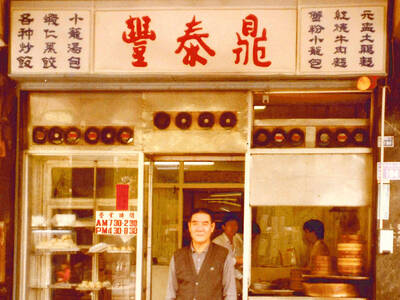
March 24 to March 30 When Yang Bing-yi (楊秉彝) needed a name for his new cooking oil shop in 1958, he first thought of honoring his previous employer, Heng Tai Fung (恆泰豐). The owner, Wang Yi-fu (王伊夫), had taken care of him over the previous 10 years, shortly after the native of Shanxi Province arrived in Taiwan in 1948 as a penniless 21 year old. His oil supplier was called Din Mei (鼎美), so he simply combined the names. Over the next decade, Yang and his wife Lai Pen-mei (賴盆妹) built up a booming business delivering oil to shops and
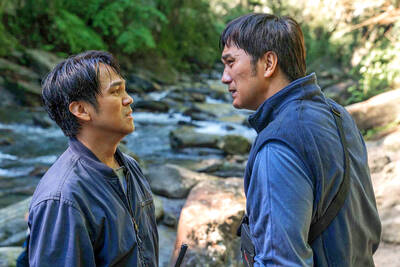
Indigenous Truku doctor Yuci (Bokeh Kosang), who resents his father for forcing him to learn their traditional way of life, clashes head to head in this film with his younger brother Siring (Umin Boya), who just wants to live off the land like his ancestors did. Hunter Brothers (獵人兄弟) opens with Yuci as the man of the hour as the village celebrates him getting into medical school, but then his father (Nolay Piho) wakes the brothers up in the middle of the night to go hunting. Siring is eager, but Yuci isn’t. Their mother (Ibix Buyang) begs her husband to let

The Taipei Times last week reported that the Control Yuan said it had been “left with no choice” but to ask the Constitutional Court to rule on the constitutionality of the central government budget, which left it without a budget. Lost in the outrage over the cuts to defense and to the Constitutional Court were the cuts to the Control Yuan, whose operating budget was slashed by 96 percent. It is unable even to pay its utility bills, and in the press conference it convened on the issue, said that its department directors were paying out of pocket for gasoline

On March 13 President William Lai (賴清德) gave a national security speech noting the 20th year since the passing of China’s Anti-Secession Law (反分裂國家法) in March 2005 that laid the legal groundwork for an invasion of Taiwan. That law, and other subsequent ones, are merely political theater created by the Chinese Communist Party (CCP) to have something to point to so they can claim “we have to do it, it is the law.” The president’s speech was somber and said: “By its actions, China already satisfies the definition of a ‘foreign hostile force’ as provided in the Anti-Infiltration Act, which unlike